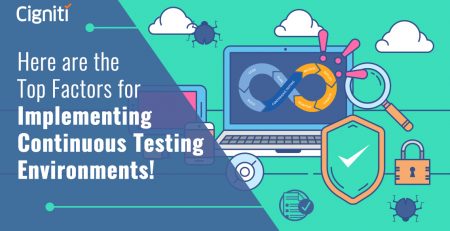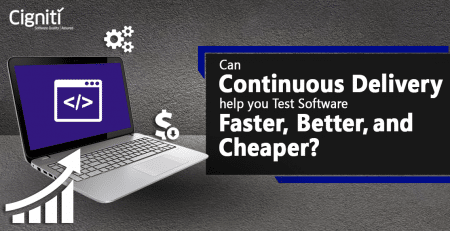Continuous Testing practices that separate DevOps leaders from laggards
The pre-requisite for customer constancy and digital success is to deliver high quality software at high speed.
Customers in the digital era are well positioned to choose the client of their choice who can provide superior experience at pace with heightened quality and trifling cost.
Enterprises that do not meet their expectations and can’t acclimatize to new business archetypes are on the verge of losing their business and customers to competitors who can.
How can enterprises deliver quality with speed and accelerate time to market?
In the current digital evolution, quality and speed have become the major pillars of growth for any enterprise.
It eventually led to a massive shift in the software delivery system where just building and releasing a product would not suffice.
Enterprises need to implement an agile approach with a constant check on the evolving customer needs to deliver quality with speed and reduce the time to market.
Recent studies gleaned from reliable sources have proven that DevOps with continuous testing is one such cultural shift that complements quality and faster time to market.
According to a recent research conducted by Forrester, “Firms running Agile & DevOps as a single transformation are 35 percentage points more likely to see improved technical quality and 28 percentage points more likely to see faster business value in the software they release. 72% of firms agree that testers are critical to continuous delivery success.”
DevOps teams take charge of building Continuous Integration (CI) and Continuous Delivery (CD) pipeline to increase product quality and agility, thus reducing last minute fright associated with the releases. Continuous testing is a vital fragment of this CI/CD pipeline that is attained through test automation.
Implement an effective CI/CD pipeline
Embarking on a scalable CI/CD DevOps implementation is pivotal to harness the total benefits of a contemporary DevOps platform.
Per Gartner, “DevOps represents a change in IT culture, focusing on rapid IT service delivery through the adoption of agile, lean practices in the context of a system-oriented approach. DevOps emphasizes people (and culture), and it seeks to improve collaboration between operations and development teams. DevOps implementations utilize technology — especially automation tools that can leverage an increasingly programmable and dynamic infrastructure from a life cycle perspective.”
DevOps leaders play a pragmatic role in ensuring that an efficacious CI/CD pipeline is built, where developers code transits from their local server to the production environment via the CI/CD pipeline.
This CI/CD pipeline implementation entails 4 stages:
- Commit: In this stage, the developers local code with latest features are integrated and CI/CD tools performs the required unit and sanity tests.
- Build: This is where the tested and integrated code goes through a build mechanism. Ideally, the developers push the artefacts to the registry.
- Test: Alpha and Beta tests are conducted in this stage where the performance of the application is tested between every build before it is readied for deployment and sent to the final stage.
- Deploy: The application goes LIVE after the build has gone through all the tests.
An effective CI/CD pipeline implementation is imperative in building an agile DevOps for enterprises.
According to Lucia Cavero-Baptista, Automation Expert at Leapwork, “A CI/CD pipeline aims to mitigate the risks involved in releasing the software into production. However, its efficiency relies heavily on automation, so achieving success with DevOps stands or falls with how well the development department works with automation and which tools are at their disposal.”
The success of DevOps is measured by how well the CI/CD pipeline is automated by continuous testing and this is what separates DevOps leaders from laggards.
How continuous testing practices separates DevOps leaders from laggards
According to Diego Lo Giudice, VP/Principal Analyst at Forrester, “There are 3 key differentiators that separate DevOps leaders from laggards. Firms with the most successful DevOps initiatives do a number of things differently from their peers:
- They are transforming software testing into Continuous Testing by adopting five core practices, such as automating end-to-end functional testing and integrating testers into cross-functional teams.
- They are almost twice as likely to consider automating the software quality process to be a “critical business differentiator.”
- They are significantly more likely to have high levels of automation for key testing and QA processes (test case design, functional test automation, test data management, etc.).”
The key findings from the research report clearly exemplifies the critical role of continuous testing.
It is palpable that enterprises are transfiguring to Continuous Testing by espousing 5 core practices –
- Enterprises should prioritize that their testers continuously upgrade their skills and adequate budget must be catered to meet all the testing needs.
- All round functional testing should be automated.
- All the testers must be integrated into cross-functional teams.
- Continuous testing must be implemented across the 4 elements of CI/CD pipeline.
- Shift-left techniques must be implemented so that testing is done from the start of the development life cycle.
Enterprises that execute these core practices are the ones who deliver quality at speed and generate a better return on investment (ROI).
While many enterprises who implement DevOps in agile environment believe to be doing it the right way, research studies divulge that only a few are following the best practices of continuous testing.
Enterprises that follow the best continuous testing practices reap in a lot of benefits.
Benefits of implementing DevOps and continuous testing practices
Continuous testing in DevOps is an ameliorate amalgamation to stay ahead of the curve.
Implementing DevOps technologies and continuous testing practices helps CXO’s bring about a cultural shift that gives a host of benefits such as –
- Greater collaboration across teams.
- Improved quality of code.
- Increased response rate for business changes.
- Inculcation of shift-left practices and
- Creating an environment of growth for Software Development Engineers in Test (SDETs).
All these benefits provide a robust and secure DevOps solution and it is imperative to realistically measure and up the game by adhering to the best continuous testing practices.
According to Puppet’s 2020 State of DevOps report, “Organizations who’ve embedded security into the entire DevOps lifecycle can solve nearly half of their critical vulnerabilities in under 24 hours. Less mature orgs, however, might only be able to solve 25% of these in the same period.”
Achieving fast and continuous development & deployment of business-critical applications across diverse platforms requires seamless collaboration among development, test automation, and operations teams.
This is where DevOps raises to the occasion and enterprises implementing it the right way will make a difference.
Wrapping up
DevOps approaches & DevOps technologies such as DevTestOps, DevSecOps, AIOps, Continuous Testing, etc. connect the teams to deliver quality at high speed, stay competent, and keep up with customer preferences.
Cigniti’s DevOps Test Center of Excellence (TCoE) provides a host of services including:
- DevOps practice readiness & maturity assessment: Assess the current state of DevOps model adoption, DevOps automation practices, processes, & tools against the DevOps maturity model.
- DevOps implementation for QA: Implement standardized process, frameworks, and tools into the DevOps setup.
- Automated test orchestration solutions: Build end-to-end automated solutions for Continuous Testing that work with CI and CD tools.
- Tool feasibility & recommendations: Identify best fit test automation tools to ramp up software delivery.
Cigniti has forged strategic partnerships with many of the industry’s leading testing tool providers such as Tricentis, enov8, HP, Experitest, Kiuwan, XebiaLabs, ElectricCloud, Leapwork, and more. Our strategic partnerships with multiple tool vendors help us give our clients best-in-class software test automation services ensuring continuous testing.
Schedule a discussion with our DevOps Testing experts to know more about continuous testing practices that separate DevOps leaders from laggards.





Leave a Reply